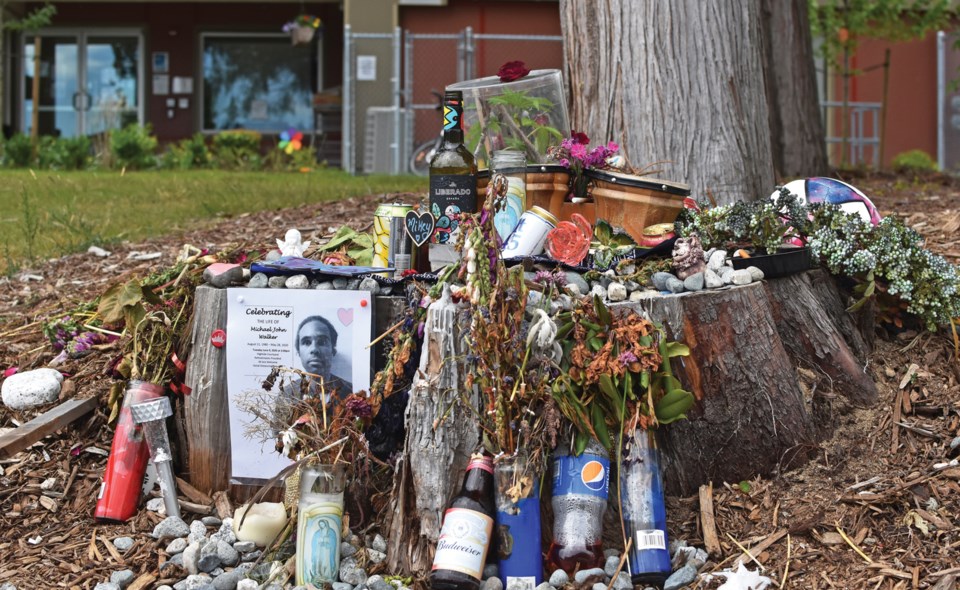No formal events were held on the Sunshine Coast to mark International Overdose Awareness Day on Aug. 31, but the crisis continues to leave its mark on the community.
In Sechelt, the number of overdose calls this year has reached 46 as of Aug. 31, surpassing 2019’s total of 41 calls. May and July were particularly intense – both months saw calls double to 10 compared with last year. There were five overdose calls in Sechelt this August.
Over the past four months overdose calls have also been above average for the Lower Sunshine Coast, which includes Sechelt. There were 10 calls in August, 13 in July and 12 in June, bringing the total to date to 77. All of last year saw a total of 97 calls.
Provincially, paramedics respond to about 80 overdose calls a day.
Those numbers also mirror a concerning upward trend in deaths province-wide. In July, 175 people died due to illicit drug toxicity, according to the latest BC Coroners Service report published last week, and two of those deaths occurred in the North Shore/Coast Garibaldi region, which includes Lower Sunshine Coast. The B.C. total is more than homicides, motor vehicle accidents and suicides combined.
“There is nothing to point towards that this is getting better,” said Meghan Burrows, project lead for the Sunshine Coast Community Action Team (CAT) – a multidisciplinary group of stakeholders that includes people who use drugs, who work to reduce the risk of overdose.
Those increases come even as more aggressive measures have been taken to reduce deaths, poisonings and overdoses on the Sunshine Coast, including the establishment of an Overdose Prevention Task Force and a public safe consumption site at the RainCity Housing shelter at 5653 Wharf Ave. in Sechelt in July.
The overdose prevention site has been “well used,” according to RainCity communications manager Bill Briscall. On average between 15 and 20 people use the site each day. “We feel fortunate that we’re able to provide this service in a time of such heightened danger for people who use drugs.”
Efforts are underway by CAT to increase staffing at the site.
The group has also recently launched a Sunshine Coast safe consumption hotline (778-897-2204), which runs daily from from 6 p.m. to 3 a.m. People with experience using drugs operate the phone line and have been trained in crisis response for mental health with an addictions focus.
“It allows you to use with supervision and if they hear you not being responsive at any point in time they will connect you directly to the ambulance,” said Burrows. Callers don’t need to disclose their identity.
On Aug. 20 an education event was held with staff from the Sunshine Coast Regional District, and CAT is working on making an overdose prevention strategy on the Sunshine Coast publicly available.
Meanwhile, on Aug. 31 and Sept. 1 in Sechelt, CAT and Vancouver Coastal Health were training people who use drugs to work at safe consumption sites, as well as offering guidance on leadership.
RainCity Housing hadn’t planned any events mainly due to COVID-19 but signs about the day were posted at sites operated by the service provider, and conversations around harm reduction and safe supply have also been stepped up, Nick Gaskin, Sunshine Coast Homelessness Services manager, told Coast Reporter.
In a release acknowledging International Overdose Awareness Day, Judy Darcy, Minister of Mental Health and Addictions, blamed this year’s 909 deaths related to the overdose crisis on an illegal drug supply more toxic than ever in B.C. and the unintended consequences of COVID-19 public health restrictions. As of Aug. 31, 208 people have died in B.C. from COVID-19.
In June, chief coroner Lisa Lapointe said border closures have disrupted drug supply chains, resulting in people without much expertise producing more toxic substances. As well, social distancing has led to more people using alone.
Burrows told Coast Reporter she doesn’t expect to see a decrease in the trend until COVID-19 public health measures change. “I think that when we can look and see that things are starting to change for COVID, then that’s when you could expect to have a different pattern with the fatalities for overdoses,” she said.
People who use drugs are strongly encouraged not to use alone. BCEHS also advises that people use the Lifeguard App, a tool that automatically calls first responders if an overdose occurs. Patients have a 95 per cent chance of surviving an overdose if first responders are called.



